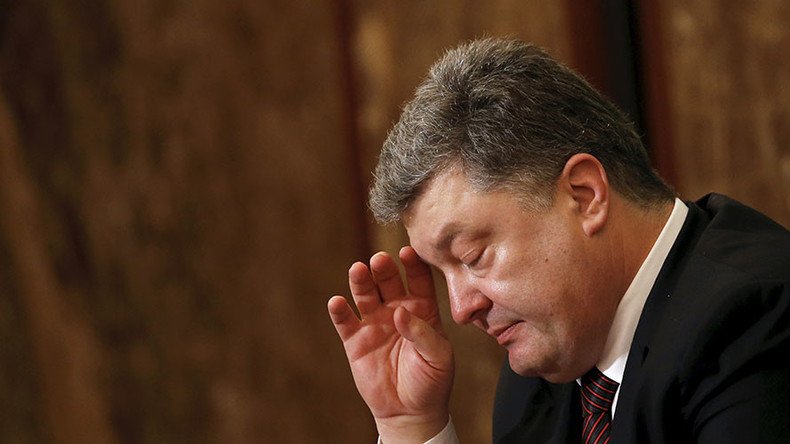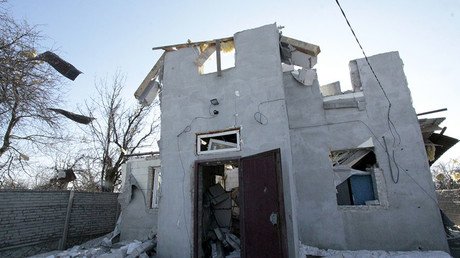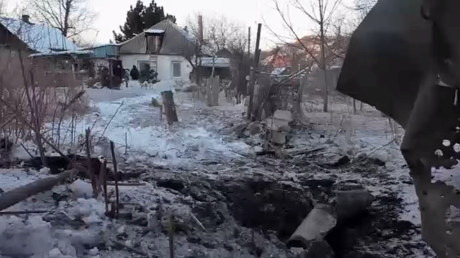Backed into a corner, Kiev reignites the Ukraine War

The old journalistic maxim, “report what you know and stick to the facts,” has been difficult to honor during the Ukraine conflict. Because while every military confrontation has a “fog of war,” this firefight has gone further.
It has a sort of "cloud of war.” And a big thick and grey one at that, which envelopes everyone who tries to penetrate it in all sorts of mud, grime and manure.
At this point, almost all observers who’ve touched it have shipped a soiling or six, and that’s why everyone - except the poor, unfortunate locals caught up in the battlegrounds - felt relieved when the matter appeared to have become frozen after the Minsk accords. And a nod seemed as good as a wink for quite some time.
However, now the situation has changed. And dramatically at that. From 2014, until two weeks ago, the demarcation line was clear. The Kiev regime was supported by, and propped up by, the Obama administration in Washington. And the ethnic Russian rebels they fought were backed from Moscow.
While the former US leader undoubtedly regarded Ukraine as an unwanted headache, he deferred to powerful figures who had skin in the game. Like Joe Biden, whose family has business interests there, and Victoria Nuland, an ideologue who helped foment the Maidan movement and chose the subsequent rulers in Kiev.
There was also bi-partisan support from the likes of John McCain and other Republicans, who still adhered to Bush-era principles regarding NATO expansion. Not to mention the “containment” of Russia and the long-standing desire to prevent any potential rapprochement between Moscow and other European states, notably Germany, which might threaten US hegemony in the region.
Fresh Ideas
But now there’s a new sheriff in town. One that apparently has no time for the consensus which has dominated since 1945. Which amounts to “Russia is only useful when it’s weak.”
Today, in Donald Trump’s view, the biggest threats to American security don’t emanate from the Kremlin. Instead, they are Islamic terrorism and the rise of China. Furthermore, the new President apparently believes that Russia can be useful in both situations. That said, Moscow, which has cultivated close relations with Beijing, is surely only interested in cooperating on the former mission.
Adding fuel to the fire, Trump might even have a personal vendetta here. After all, it was Ukrainian meddling in last year’s election that brought down Paul Manafort, a prominent adviser. And Petro Poroshenko’s team made it abundantly clear they were waiting for Hillary Clinton to walk into the White House and bankroll them for the next four years. When Trump defied the odds and defeated her, it was a disaster for Kiev.
Paul Simon once crooned: “Hello Darkness, my old friend, I’ve come to talk with you again.” And that’s what the resumption of heavy duty violence in Ukraine feels like. Because there is nothing to be gained from it. Put simply, Russia hasn’t the resources, or desire, to invade or suppress the entire country. And Kiev cannot defeat the ethnic Russian rebels in the east, unless Moscow chooses to abandon them. Which is highly unlikely.
Yet, the problem now is that the Poroshenko regime feels cornered because it has probably lost its main sponsor in Washington. And bland State Department comments on the renewed violence this week underscore this. Devoid of haughty condemnations of Russia, they also contradict Kiev’s casualty figures.
Committed Allies?
Additionally, Europe (outside of Sweden, Poland and the Baltics) has never had much interest in Ukraine. Nobody can point to a concerted effort to support it financially and it’s been understood that EU membership was never on the table for the poorest - and arguably the most corrupt - state on the continent. Instead, EU members took their direction from Washington and halfheartedly showed limited solidarity. Best exemplified by Nuland’s infamous “F**k the EU” comment to former US ambassador Geoff Pyatt.
Thus, Kiev has finally reached the stage where it pretty much has nothing left to lose. And this explains the sudden escalation. Poroshenko, and the uber-nationalist ‘volunteer battalions’ he must defer to, is trying to kick the night until it bleeds daylight. And this is entirely futile.
Here’s what we know. The Ukrainian President was in Berlin for talks with Angela Merkel. Sources in Berlin suggest how the Chancellor gave him a tongue-lashing about corruption. And that he used the, conveniently timed, resumption of hostilities as an excuse to avoid whatever lecture German officials had planned for the following day.
Kiev immediately went into hysteria mode, insisting that the rebels had launched some kind of assault on their forces. But this makes no sense, because the ethnic Russians have nothing to gain from a new offensive. And nobody believes that Moscow, exploring opportunities to build new relations with the West, would acquiesce to any form of provocation right now.
What appears to have occurred is that a creeping Ukrainian advance on the town of Adiivka was going relatively smoothly, until the insurgents copped it and fired back with artillery. And this resulted in a heavy death toll.
Hard To Accept
As playing the victim has been successful for Kiev since 2014, they immediately flung blame at the rebels. But it was clear they were crying wolf shortly afterwards, when the deputy defense minister, Igor Pavlovsky, did something so dimwitted that it requires an apology to dimwits.
“As of today, despite everything, metre by metre, step by step, whenever possible, our boys have been advancing,” he told domestic media. And, just like that, he kiboshed Kiev’s entire narrative. By exposing how the regime had provoked the escalation. As it happened, German media agreed. Sueddeutsche Zeitung, regarded as a paper of record and establishment journal, reported how Berlin is seeing through Ukraine’s crocodile tears.
Russia’s chief diplomat, Sergey Lavrov, agreed. “Even the biased German press acknowledged that Poroshenko was behind it,” he snorted.
For its part, Moscow has been consistent on how it sees any resolution to the crisis. That is the implementation of the Minsk agreements, where Kiev agreed to grant semi autonomy to the Lugansk and Donetsk regions in exchange for the territories returning to Ukrainian jurisdiction after elections are held. The problem is that the regime - vulnerable to radical nationalists who increasingly influence policy - can’t implement what they signed without risking another coup.
As a result, Poroshenko is fairly goosed. He’s probably lost his American patrons and the Europeans have grown tired of his waffle. Meanwhile, he can’t do a deal with Moscow because his own headbangers would lynch him. At the end of the day, Kiev bet the house on Hillary. And they lost.
The statements, views and opinions expressed in this column are solely those of the author and do not necessarily represent those of RT.















